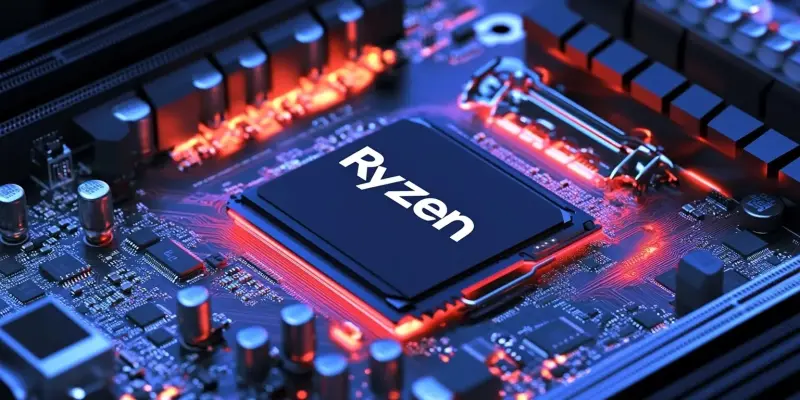AMD’s recently unveiled Ryzen AI Max chip has garnered significant attention for its remarkable performance improvements, particularly in graphical processing and artificial intelligence capabilities. As the latest addition to AMD’s growing lineup of high-performance processors, the 16-core Ryzen AI Max aims to be the go-to choice for content creators and gamers who demand the utmost in processing power. To demonstrate the chip’s prowess, AMD strategically compared its new Ryzen AI Max to Apple’s M4 and M4 Pro chips, which are integral components of the latest MacBook Pro models. However, the lack of comparison against Apple’s more potent M4 Max chip has raised a few eyebrows within the tech community.
Performance Showcases and Strategic Comparisons
AMD has been vocal about the Ryzen AI Max chip’s capabilities, citing an 86% performance advantage in a v-ray workload when compared to Apple’s M4 Pro. This benchmark was bolstered by AMD’s claims of leading performance in other rendering applications such as Blender and Corona. However, despite these impressive stats, some questions remain as to why AMD opted to avoid direct comparisons with Apple’s top-tier M4 Max chip. The M4 Max, featuring a 16-core CPU and up to a 40-core GPU, would likely offer more of a competitive challenge to the Ryzen AI Max but could potentially outperform AMD’s new offering in many benchmarks.
The selective nature of AMD’s comparison has not gone unnoticed by industry analysts and tech enthusiasts. While benchmarking against the M4 and M4 Pro is a logical move, given their widespread use, the omission of the M4 Max from direct comparison suggests a strategic avoidance. AMD’s choice appears to be aimed at highlighting the strengths of the Ryzen AI Max without risking unfavorable comparisons that might showcase potential areas where Apple’s M4 Max outshines it. This decision underscores the importance of fair and comprehensive benchmarking to provide a complete performance picture of advanced technology.
Power for Creators and Gamers
Providing ample power for demanding applications, AMD’s Ryzen AI Max is poised to be an ideal solution for those in the creative and gaming industries. Its 16-core architecture, designed to handle intense computational tasks efficiently, leverages AI capabilities to offer smoother performance in tasks ranging from video editing to game development. This focus on high-performance computing makes the Ryzen AI Max particularly appealing to users who require more than just everyday computing power.
However, the multi-threaded Cinebench 2024 test revealed that the Ryzen AI Max demonstrated only a slight performance edge over the 12-core M4 Pro. This finding puts into perspective the relative gains and highlights the importance of examining multiple benchmarks for a more nuanced understanding. AMD’s decision to spotlight the Ryzen AI Max’s lead in specific tests like v-ray and Blender further illustrates their strategy to emphasize the chip’s strengths in particular scenarios. The modest improvement in Cinebench indicates that, while the Ryzen AI Max is indeed powerful, it may not drastically outpace all of its competition in every metric.
A Competitive Landscape Awaits
AMD’s newly revealed Ryzen AI Max chip has drawn significant attention due to its outstanding performance enhancements, especially in graphical processing and artificial intelligence capabilities. This 16-core processor is the latest addition to AMD’s expanding lineup of high-performance chips and is designed to be the top choice for content creators and gamers who require the highest level of processing power. To showcase the chip’s abilities, AMD carefully compared the Ryzen AI Max to Apple’s M4 and M4 Pro chips, which are key components in the latest MacBook Pro models. The comparisons highlighted the Ryzen AI Max’s superior capabilities, but the absence of a direct comparison with Apple’s more powerful M4 Max chip has sparked some interest in the tech community. This omission has led to some speculation about how the two most advanced chips would stack up against each other, with enthusiasts eager to see head-to-head benchmarks that could provide clearer insights into their real-world performance.

